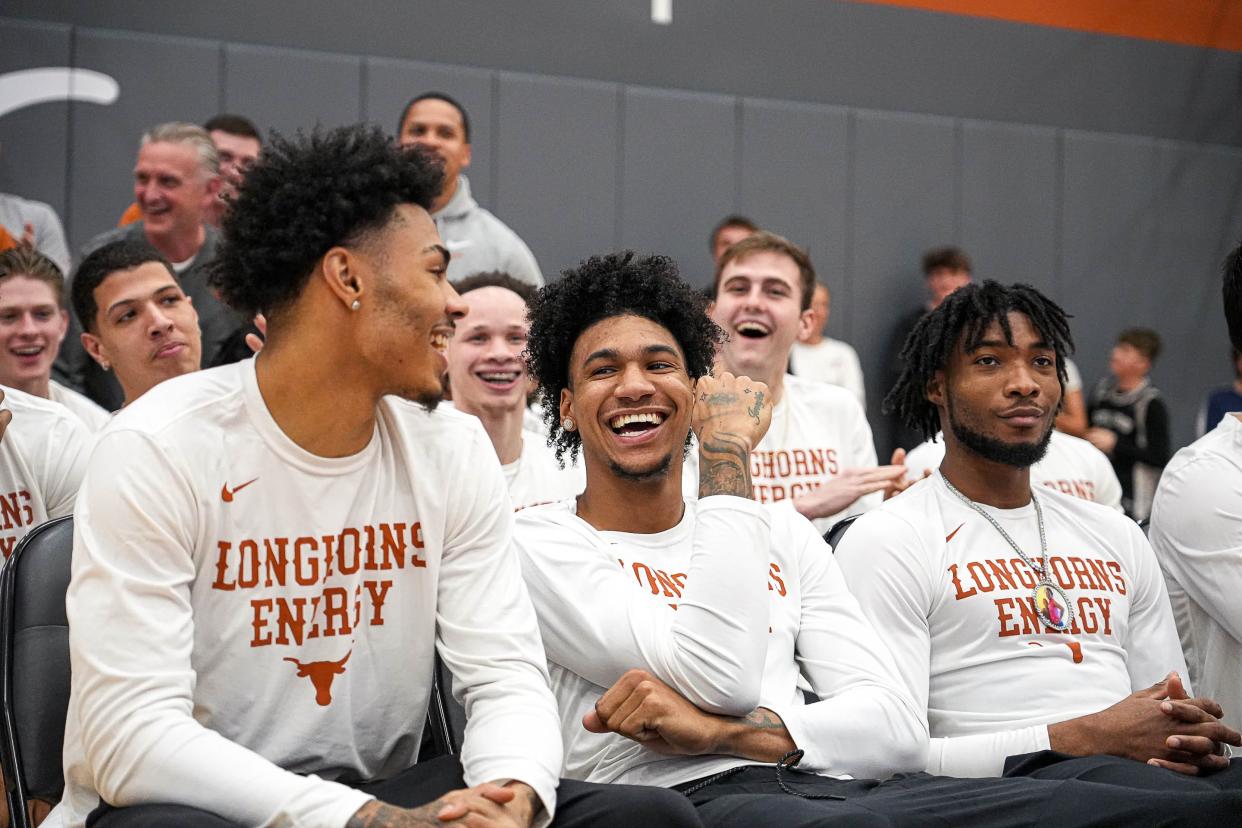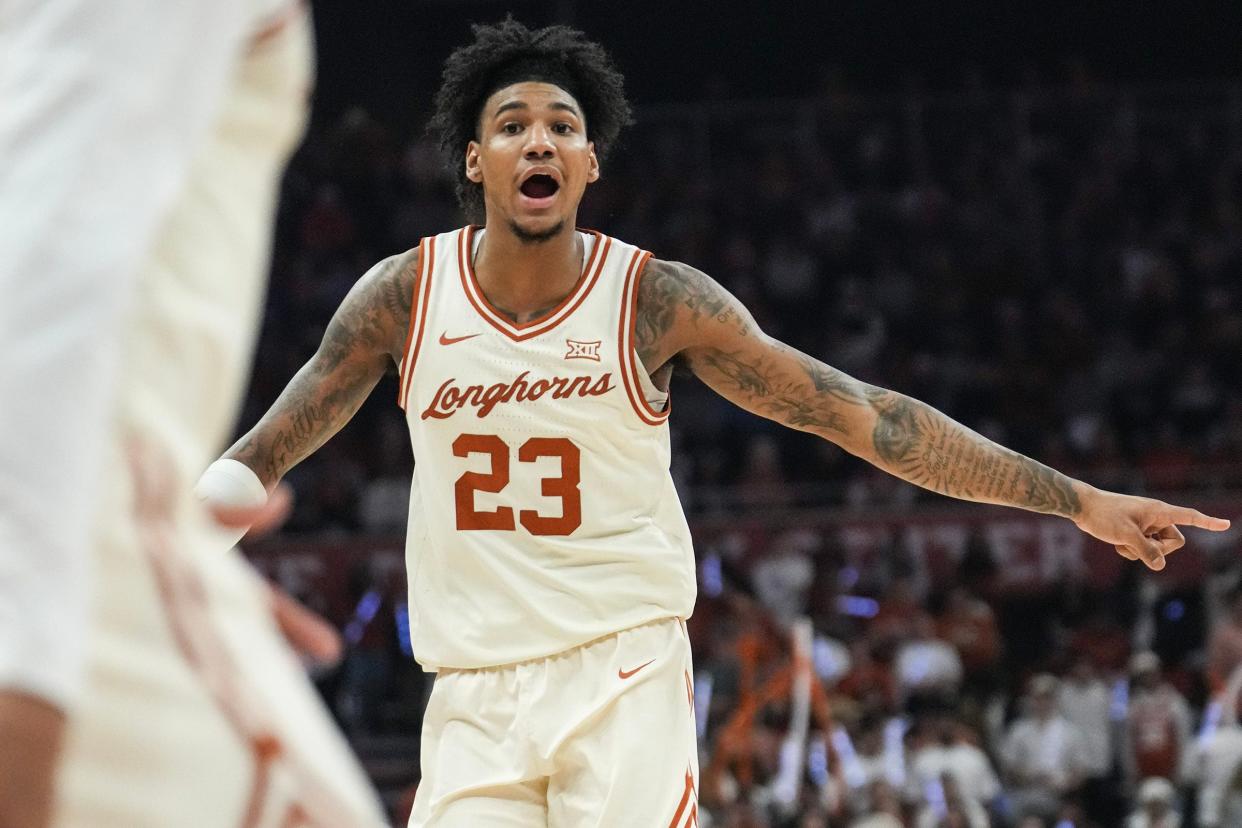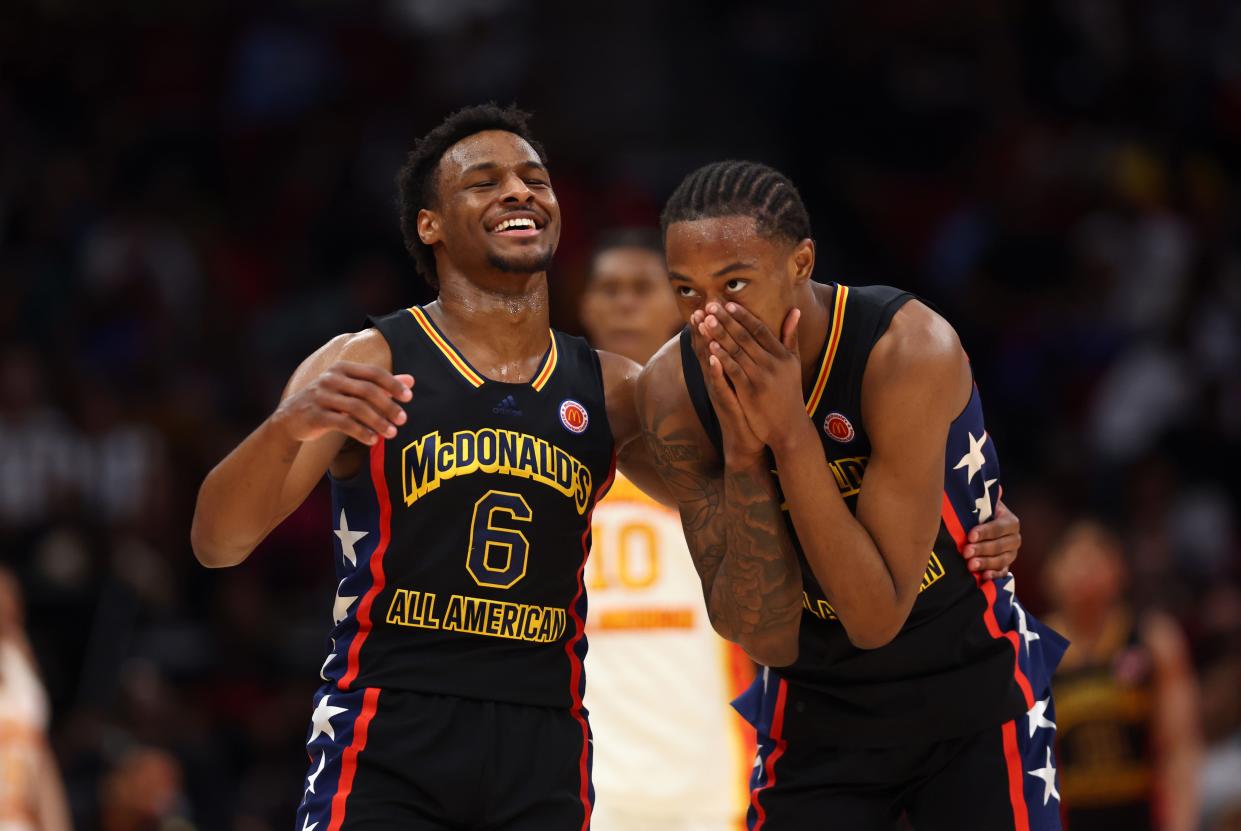Texas basketball players, coaches: NBA G League Ignite helped players but no longer needed
CHARLOTTE, N.C. — When Texas basketball coach Rodney Terry heard that the NBA was shuttering its G League Ignite project after three seasons, he had one key question.
“Why couldn’t they have done this last year, and we could have had Ron Holland?” Terry said before bursting into laugher during an interview in a hallway inside Spectrum Center on Friday. “We could have used him.”
Holland, a five-star recruit from the class of 2023 who signed with Texas, never joined the Longhorns’ basketball team. Instead, he signed with the G League Ignite, a team of high-level prospects straight out of high school that competed in the G League — the NBA’s developmental league — while preparing for the NBA draft.
Based on the bottom line of player development, Holland’s decision made sense. The 6-foot-8 forward projects as a lottery pick in the 2024 draft after averaging 19.5 points, 6.7 rebounds and 3.1 assists in 33.6 minutes a game. He also pulled in an estimated $500,000 a year while facing stiff competition in the G League, which should help steel him for future NBA battles.
But NIL options in the college game have tempered the financial appeal of playing for the Ignite. College players can now make money whether through a school’s NIL collective or through marketing opportunities. And the experience of playing in nearly empty arenas and noncompetitive games — Ignite is 2-28 against the rest of the G League — added to the NBA’s decision to end its project for elite high school prospects.
“I’d say some of the concerns (that) these players even at the highest level couldn’t earn a living in college basketball, and we, the league and the players association together, were preventing them from doing that, that dissipated because, all of a sudden, this great economic opportunity presented itself through these various programs at college,” NBA Commissioner Adam Silver said during his league’s All-Star Game break last month.

More: Brock Cunningham becomes Texas' career wins leader after opening NCAA Tournament victory
NIL makes sense and cents for elite prospects
The NBA’s decision made sense considering the new reality of college athletics, Terry and the Texas players said Friday.
“The whole NIL thing changes the whole spectrum of it,” said UT freshman guard Chris Johnson, a four-star recruit in Holland’s class who got his release from Kansas to sign with Texas last summer.
The premise of the Ignite remains appealing to players such as Johnson and fellow Longhorn Dillon Mitchell as well as every other collegiate player with NBA aspirations. Play ball against other NBA-level athletes. Get developed by NBA-level coaches. Work on your craft while preparing for your dream job.
“I was actually kind of interested in it,” said Mitchell, a 6-8 forward who was a five-star prospect coming out of high school in Florida in 2022. The Ignite “brought a lot to the table as far as young athletes go. And to get help developmentwise, that was interesting.”
Mitchell also thinks the presence of the Ignite helped expedite NIL opportunities for college athletes. Ironically, NIL has drawn criticism from those who romanticize the concept of amateur athletics, but it might just save college basketball from irrelevancy, considering the heightened appeal it has for players.
“I thought they (the Ignite) did a lot for kids who were looking towards that route,” he said. “They definitely, I would say, pushed college towards NIL. A lot of kids now are not even thinking about that (professional) route. They see what you can do in college.”

Two years into his collegiate career, Mitchell fully appreciates his decision to stay with Texas. He’s started 70 of a possible 71 games and will play in his sixth NCAA Tournament game when the Longhorns take on Tennessee in a second-round contest Saturday evening in Charlotte. Playing in hallowed gyms such as Allen Fieldhouse on the Kansas campus or at Madison Square Garden in New York offers unforgettable experiences, and the networking options for Texas athletes will pay dividends long after the games end.
“Being in March Madness, every kid dreams of that,” Mitchell said. “And the people you meet can help take you farther than just basketball.”
Johnson agreed, especially after experiencing the energy and passion at places like Allen Fieldhouse.
“I feel like the (Ignite) guys are missing out on some things,” he said. “When we went to Kansas earlier this year, it was, like, crazy. And I know those G League games, the whole arena is not even filled up.”
More: Texas basketball player Alex Anamekwe enters transfer portal after two seasons in Austin

Rodney Terry: Networking, experience invaluable
The collegiate experience. The opportunity to network. And some cold, hard cash. Those are all selling points in the NIL era for the game of college basketball, which must still compete with overseas leagues and some other professional options to lure the nation’s top high school players.
“Initially, I think the premises of (the G League Ignite) from an NBA perspective was a good idea,” Terry said. “But I think as it evolved and as NIL evolved, it became something that wasn't as attractive to the NBA.”
Or to players. Terry signed yet another five-star recruit for the 2024 class in guard Tre Johnson, who’s a possible one-and-done candidate based on his current evaluation from NBA scouts. While the 6-6 guard could still choose to play overseas before beginning his NBA career, the elimination of the Ignite enhances his chances of playing at Texas.
“I think a lot of parents and kids, they get the big picture,” Terry said. “I mean, we signed one this fall that really got the big picture. Tre Johnson is an NBA player, and he's going to have a long career at the next level. But I think you know, he and his family, they were very conscious of his future after basketball.
“I think young players (like Johnson) get a chance to come to college and get a chance to build their brand with another big-time brand for later in life. They're going to continue to play basketball at a high level and continue to develop. But they also get a chance when they're done playing basketball and the ball goes flat, they're able to tap into a network that they were able to build their brand with.”
This article originally appeared on Austin American-Statesman: Texas basketball players, coaches weigh in on end of G League Ignite
